Vestibular disease can be distressing for dog parents to see in their pup. However, this condition which affects balance often begins to improve after as little as a day. Here, our Ventura vets share some of the symptoms and treatments for vestibular disease in dogs.
Vestibular Disease in Dogs
Commonly known as "old dog syndrome," canine idiopathic vestibular disease is a sudden disturbance of your dog's balance, although it isn't progressive. This is caused by issues which affect your dog's inner ear (or vestibular system) and their middle ear.
The vestibular system is responsible for your pup's balance, which is why dizziness and difficult maintaining balance are associated with vestibular disease,
The symptoms of vestibular disease are their most severe during the first 24 to 48-hours. After that, you dog will likely show noticeable improvement. Your dog will probably achieve a full recovery between two and three weeks from the symptoms first appearing.
Causes of Vestibular Disease
There are many reasons why your dog might experience vestibular disease. Ear infections, hypothyroidism, tumors, trauma, and perforated ear drums can all lie at the root of vestibular disease. If your vet isn't able to find a cause for your dog's vestibular disease after examination, the diagnosis will be idiopathic vestibular disease.
Dogs of any age or breed can experience vestibular disease. However, German shepherds and Doberman Pinschers are seemingly predisposed to developing the condition and older dogs of any breed are commonly diagnosed with it.
Symptoms of Vestibular Disease in Dogs
As mentioned above, vestibular disease is a condition that affects balance. If your pup has vestibular disease you may notice one or more of the following symptoms:
- Pronounced Head Tilt
- Circling in one direction
- Reluctance to eat or drink
- Loss of balance / falling over
- Rapid eye movement while awake
- Staggering or Stumbling
- Nausea or vomiting
- Poor coordination
- Standing with legs spread wide
- Choosing to sleep on hard surfaces
If your dog shows any of signs listed above contact your vet for advice.
While the above symptoms are typical of vestibular disease, they could also be the result of a more serious condition. Based upon your dog's medical history and overall health, your vet may recommend that you bring your dog in for an examination.
Treatment for Vestibular Disease in Dogs
While vestibular disease will cause your pup some discomfort, lack coordination and possibly motion sickness, the condition isn't dangerous or painful. It will probably clear up on its own and without treatment in a couple weeks.
All of that being said, it is key to keep and eye on your dog and their health so you can manage symptoms. If you notice the condition worsening after 48 hours, contact your vet to schedule and examination as soon as possible. Your vet will examine your dog and keep a look out for serious conditions which might be causing these symptoms.
If your dog is having nausea or is vomiting due to vestibular disease, your vet may prescribe anti-nausea medication to help relieve those symptoms. If your dog is experiencing difficulty drinking because of their dizziness, they may require treatment with IV fluids to help keep them hydrated until their symptoms pass.
The bottom line is that the main treatment for canine idiopathic vestibular disease is patiently waiting while your dog recovers.
Helping Your Dog Feel More Comfortable While They Recover
To help your canine companion recover, make sure they have a comfortable place to rest and are able to easily access food and water when they want to. Since vestibular disease affects your dog's balance, it would be best to keep the floor clear of obstacles and make sure your pup doesn't try to walk on stairs.
If your dog is experiencing symptoms like those listed above, contact your vet to book an appointment. If you're concerned about the health of your pup, or if your dog is experiencing severe symptoms, visit the expert team at Veterinary Medical and Surgical Group (VMSG) for urgent care.
Looking for a veterinary specialist in Ventura?
We're always accepting new patients, so contact our veterinary hospital today to book your pet's first appointment.Related Articles View All
Anesthesia for Dogs
Most dogs are given anesthesia when they are spayed or neutered, and the majority of them will require it at least once throughout their lives. Our four-legged pets, like us, may require anesthesia as part of a surgery or procedure. Today, our Ventura vets discuss what you should know about anesthesia for dogs.
MRI for Dogs: How They Can Help
At Veterinary Medical and Surgical Group (VMSG) in Ventura, our board-certified veterinary neurologists use our in-house MRI to help diagnose a range of health issues in dogs from a ruptured cranial cruciate ligament to brain tumors. Today our vets explain why MRI scans for dogs can be helpful, and the conditions this technology can help diagnose.
FHO Surgery in Cats
FHO surgery can be an effective and relatively inexpensive surgical treatment option for hip problems in cats. Today, our Ventura vets describe the hip anatomy of cats, hip problems that could affect your kitty and what’s involved in FHO surgery and recovery.
Cataract Surgery in Dogs
Cataracts prevent light from reaching the retina of your dog, resulting in blurred vision and, ultimately, blindness. In today's blog, our Ventura veterinarians discuss the causes and symptoms of canine cataracts, as well as the surgery used to treat this eye condition.
Signs Your Pet Should See an Emergency Vet
Conditions that necessitate immediate medical attention in pets can arise in the same way that they do in humans. Ventura veterinarians explain when emergency care is necessary and what to do in those situations.

